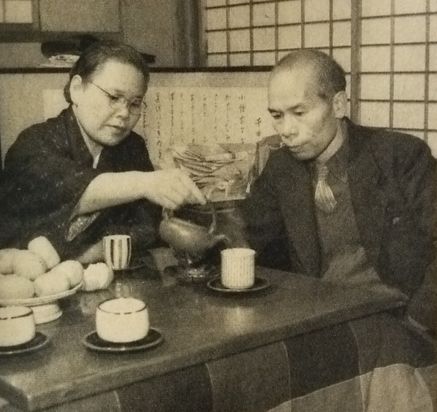Shigeji Tsuboi on:
[Wikipedia]
[Google]
[Amazon]
 was an influential
was an influential
Japan
Japan is an island country in East Asia. Located in the Pacific Ocean off the northeast coast of the Asia, Asian mainland, it is bordered on the west by the Sea of Japan and extends from the Sea of Okhotsk in the north to the East China Sea ...
ese poet
A poet is a person who studies and creates poetry. Poets may describe themselves as such or be described as such by others. A poet may simply be the creator (thought, thinker, songwriter, writer, or author) who creates (composes) poems (oral t ...
of the modern era of Japanese literature
Japanese literature throughout most of its history has been influenced by cultural contact with neighboring Asian literatures, most notably China and its literature. Early texts were often written in pure Classical Chinese or , a Chinese-Japa ...
. He was cofounder (with Hagiwara Kyojiro) of the Dadaist-Anarchist poetry journal ''Aka tokuro'' (Red and Black, 1923–24) and ''Bungei Kaiho'' (Literary liberation, 1927).
History
Tsuboi was born on the island ofShōdoshima
Shōdoshima or is an island located in the Seto Inland Sea, Inland Sea of Japan. The name means "Island of Azuki bean, Small Beans". There are two towns on the island: Tonoshō, Kagawa, Tonoshō and Shodoshima, Kagawa, Shōdoshima, composing the ...
and studied briefly at Waseda University in Tokyo, but he never graduated. He started as a modernist
Modernism was an early 20th-century movement in literature, visual arts, and music that emphasized experimentation, abstraction, and Subjectivity and objectivity (philosophy), subjective experience. Philosophy, politics, architecture, and soc ...
and anarchist
Anarchism is a political philosophy and Political movement, movement that seeks to abolish all institutions that perpetuate authority, coercion, or Social hierarchy, hierarchy, primarily targeting the state (polity), state and capitalism. A ...
, but as Marxism
Marxism is a political philosophy and method of socioeconomic analysis. It uses a dialectical and materialist interpretation of historical development, better known as historical materialism, to analyse class relations, social conflict, ...
grew stronger in Japan, he broke up with the anarchists (which cost him a broken arm) and started to work for the proletarian
The proletariat (; ) is the social class of wage-earners, those members of a society whose possession of significant economic value is their labour power (their capacity to work). A member of such a class is a proletarian or a . Marxist philo ...
movement, writing short political prose pieces and being an active organizer. He was imprisoned twice; for the second time he was imprisoned with other left-wing writers and tortured until he renounced his right to publish anti-government works. This action of the government was intended to discredit the whole movement. He went home to recuperate from his ill treatment in prison. Later, Tsuboi returned from the country in despair, feeling as a traitor (he wrote about it in his poems ''Self-portrait'', ''Mask'', and ''Criminal''). He spent the whole war in Tokyo, inactive apart from forming ''Sancho kurabu'' (Sancho Panza Club), writing short humorous prose pieces with hidden anti-war messages. After the war, he helped to form two magazines, ''Shin nihon bungaku'' (New Japanese literature) and ''Gendai shi'' (Contemporary poetry) and wrote one of his most popular collections of poetry, ''Fusen'' (Air-balloon, 1957). In 1962, he joined a half dozen other left-wing writers to found the journal ''Shijin kaigi'' oets' Conference dedicated to helping workers, male and female, express their dissatisfactions about the status quo.
His wife was the popular Japanese novelist
A novelist is an author or writer of novels, though often novelists also write in other genres of both fiction and non-fiction. Some novelists are professional novelists, thus make a living wage, living writing novels and other fiction, while other ...
.
Tsuboi's poetry includes influences from traditional Japanese forms like haiku
is a type of short form poetry that originated in Japan. Traditional Japanese haiku consist of three phrases composed of 17 Mora (linguistics), morae (called ''On (Japanese prosody), on'' in Japanese) in a 5, 7, 5 pattern; that include a ''kire ...
to European movements such as anarchism, Marxism, dada
Dada () or Dadaism was an anti-establishment art movement that developed in 1915 in the context of the Great War and the earlier anti-art movement. Early centers for dadaism included Zürich and Berlin. Within a few years, the movement had s ...
and surrealism
Surrealism is an art movement, art and cultural movement that developed in Europe in the aftermath of World War I in which artists aimed to allow the unconscious mind to express itself, often resulting in the depiction of illogical or dreamlike s ...
.
Works
* ''Egg in my Palm: Selected Poetry of Tsuboi Shigeji''. Translated and compiled by Robert Epp. Stanwood, WA: Yakusha, 1993, 278 pages.References
*Novák, Miroslav, ''Ulice plná plášťů do deště'', SNKLU,Prague
Prague ( ; ) is the capital and List of cities and towns in the Czech Republic, largest city of the Czech Republic and the historical capital of Bohemia. Prague, located on the Vltava River, has a population of about 1.4 million, while its P ...
, 1963
{{DEFAULTSORT:Tsuboi, Shigeji
1897 births
1975 deaths
Japanese activists
Japanese Marxists
Japanese Marxist writers
20th-century Japanese poets
Waseda University alumni
Activists from Kagawa Prefecture